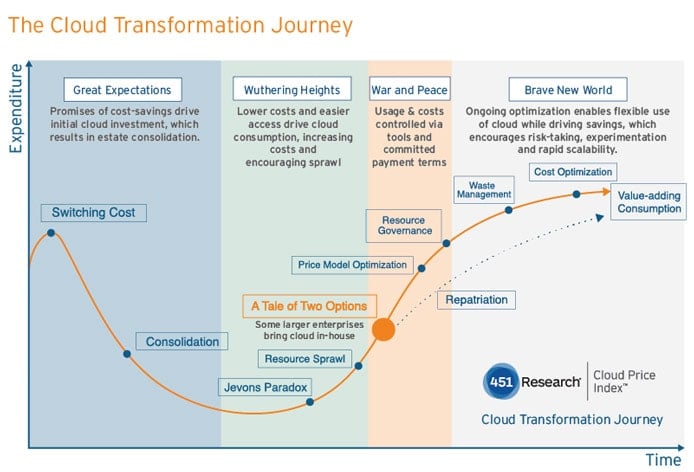
TL; DR: For nearly two decades, 451 Research has provided insightful market, business, and technological data that empower service providers, IT professionals, and investment firms to position themselves as leaders in their respective industries. Analysts at 451 Research explore trends in financial markets, technology, and the ever-changing realms of cloud hosting and the Internet-of-Things to help clients understand their position in the age of digital disruption. Chief Research Officer Brett Azuma discussed the latest noteworthy discoveries and how companies can use insights from 451 Research to make more informed decisions and capitalize on market opportunities.
In the rapid-fire evolution of the tech world, staying abreast of trends across hosting, infrastructure innovations, financial markets, and security is no simple task. It’s a job for folks with a curious nature, who thrive on delving into data with gusto, and are driven by the desire to understand what makes the IT markets tick in the digital age.
A group of industry analysts established 451 Research in 2000, recognizing at the time that there simply wasn’t enough research covering innovation and disruption, according to Chief Research Officer Brett Azuma. Today, the company explores the impact of the Internet-of-Things, artificial intelligence, and automation, among other technologies, as well as shifts in digital security practices and financial market tides that forecast the next big moves in innovation.
“All the major research companies started off trying to focus on innovation but slowly lost their ability to look at the bleeding edge of where the markets are going,” he said. “That’s been a big thing for us.”
To stay ahead of the up-and-coming innovations, Brett told us how 451 Research projects emphasize the understanding of three critical components: emerging and innovative companies, established service providers, and the exit strategy — in other words, how market trends influence tech innovation.
“What we’ve been focusing on is building products and services that enable clients to do their jobs better — whether that be understanding the size of the market, being able to run scenarios on those sizes, or being able to extract that information to put into your own models,” he said. “I think it’s important that the way we deliver our content allows us to be better embedded to help our clients do their work well.”
The Third Information Age: AI, Automation, and the Internet-of-Things
As we enter a time of increased connectivity, artificial intelligence, and IoT, everyday objects with the capability to send and receive data are transforming the way we live and work.
While they may not yet possess quite the personable charm of The Jetsons‘ retro-futuristic Rosey the Robot Maid, machine-intelligent assistants and smart appliances, including Siri, Alexa, Cortana, Google Home, and Nest devices, are increasingly common in modern households. 451 Research recognizes that, for many industries, these innovations present both new challenges and opportunities.

Executive Vice President and Chief Research Officer Brett Azuma has spent 20 years in the data analysis industry.
“Many people call this the second or third information age,” Brett said. “It has a profound impact on what we build and what cost structures will look like for some of these services.”
For instance, recent 451 Research reports cover everything from how augmented and virtual reality can impact IoT user interfaces and healthcare to customers’ brand preferences for smart home devices.
The impact of AI and machine learning is a primary focus this year for 451 Research analysts, who aim to provide a greater breadth of written and survey-based reports, forecasts, and insights to the merger-and-acquisition market.
“We use IoT as kind of an umbrella term, but to understand what’s happening and where the opportunities are, you have to actually dig into the specifics,” Brett said. “The challenge for vendors or anyone providing services in that space is, ‘How do you aggregate enough demand?’ It’s going to be like a thousand points of light. You’re going to have to actually figure out how to amalgamate enough of it to create enough demand and scale to create a profitable business.”
Coexisting with Hyperscalers: The Move to Hosting and Cloud Services
The rush to move businesses into the cloud provides an interesting framework for small hosting companies to coexist, and even thrive, among hyperscale titans like Amazon and Google.
“For years, small cloud providers and hosting companies were trying to figure out how to compete against Amazon,” Brett said. “Now, they’re trying to figure out how to leverage those technologies and how to peacefully and profitably coexist in a world full of hyperscalers.”
The changing mindset of how to securely and affordably store and manage data, coupled with the business-critical need of high-availability solutions, contributes toward the growing popularity of colocation and cloud hosting.

451 Research analysts track and project trends in the cloud hosting industry, balancing cost and usage.
“We can either modernize our really crappy datacenters, or we can move into a brand-new colocation facility,” Brett said, relaying a conversation with an acquaintance responsible for IT management at a pharmaceutical company. “It’s becoming very cost attractive to use colocation space or to look at managed hosting and cloud services as a way to reduce expenses, increase agility, and allow the elasticity that the cloud provides.”
Although AWS infrastructure and scalability is at the forefront of the industry, businesses often struggle with the service’s lack of support. That’s where providers stand to make the largest gains in cloud hosting, according to 451 Research.
“Amazon doesn’t want to own the world,” Brett said. “They have very specific things they’re going to do well, but having deep relationships with lots of enterprises isn’t something they’re built to do. Increasingly, they’re going to be dependent on other service providers — hosting companies, managed service providers — to be their way to address other parts of the market.”
Curiosity: The Cornerstone to Company Culture at 451 Research
Impeccable talent acquisition and retention are key components in a company where the original founders remain not just connected, but passionate about producing research insights alongside their analysts.
“Grooming our own talent and continuing to invest in and develop the team we have now are all things we continue to leverage, especially as we start to add more tools to the kit, more quantitative insights, more innovative technologies, and a different perspective,” Brett said.

451 Research covers many aspects of the technology and IT industries, ranging from user experience to infrastructure.
Currently, 451 Research employs more than 100 analysts, and the company is highly selective when searching for the right people and personalities to add to their ranks. The research associates program, targeted at recent college grads, recently accepted more than 1,300 applications — 451 Research only hires four associates a year.
As a 20-year veteran of the data analysis industry, Brett said that curiosity and an interest in learning often outweigh advanced experience in statistical analysis.
“There are a lot of things you can teach someone, but I can’t teach them how to be curious,” he said.
Looking Ahead: 451 Research’s Hosting & Cloud Transformation Summit
Taking its research discoveries even further, 451 Research will put on the Hosting and Cloud Transformation Summit in September in Las Vegas.
In addition to educational sessions from 451 Research analysts and business executives, the three-day event includes multiple networking events. The conference will cover more than 30 technologies, ranging from IoT and AI to cloud hosting and networking infrastructure.
A panel discussion featuring experts from AWS, Microsoft, and Alibaba Cloud will help service providers learn how to build the most beneficial relationships with hyperscalers.
“The objective is to understand what hyperscalers are looking for in partners, along with what’s successful and not successful,” Brett said. “It’s about giving our clients and attendees practical guidance in how to guide their own businesses going forward.”
HostingAdvice.com is a free online resource that offers valuable content and comparison services to users. To keep this resource 100% free, we receive compensation from many of the offers listed on the site. Along with key review factors, this compensation may impact how and where products appear across the site (including, for example, the order in which they appear). HostingAdvice.com does not include the entire universe of available offers. Editorial opinions expressed on the site are strictly our own and are not provided, endorsed, or approved by advertisers.
Our site is committed to publishing independent, accurate content guided by strict editorial guidelines. Before articles and reviews are published on our site, they undergo a thorough review process performed by a team of independent editors and subject-matter experts to ensure the content’s accuracy, timeliness, and impartiality. Our editorial team is separate and independent of our site’s advertisers, and the opinions they express on our site are their own. To read more about our team members and their editorial backgrounds, please visit our site’s About page.

